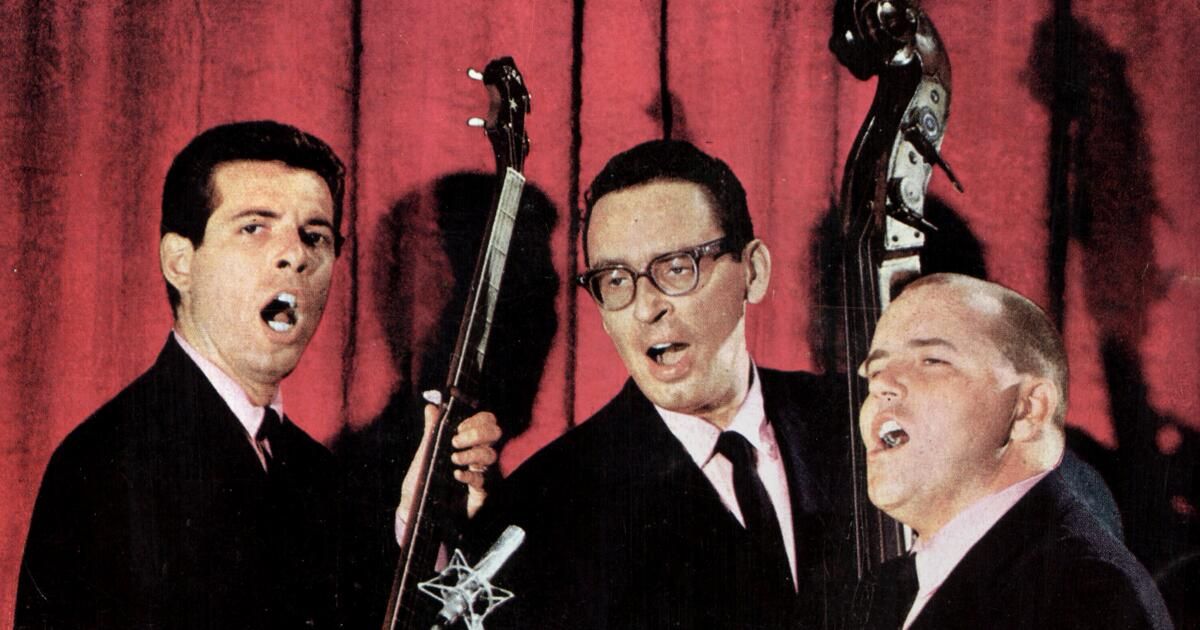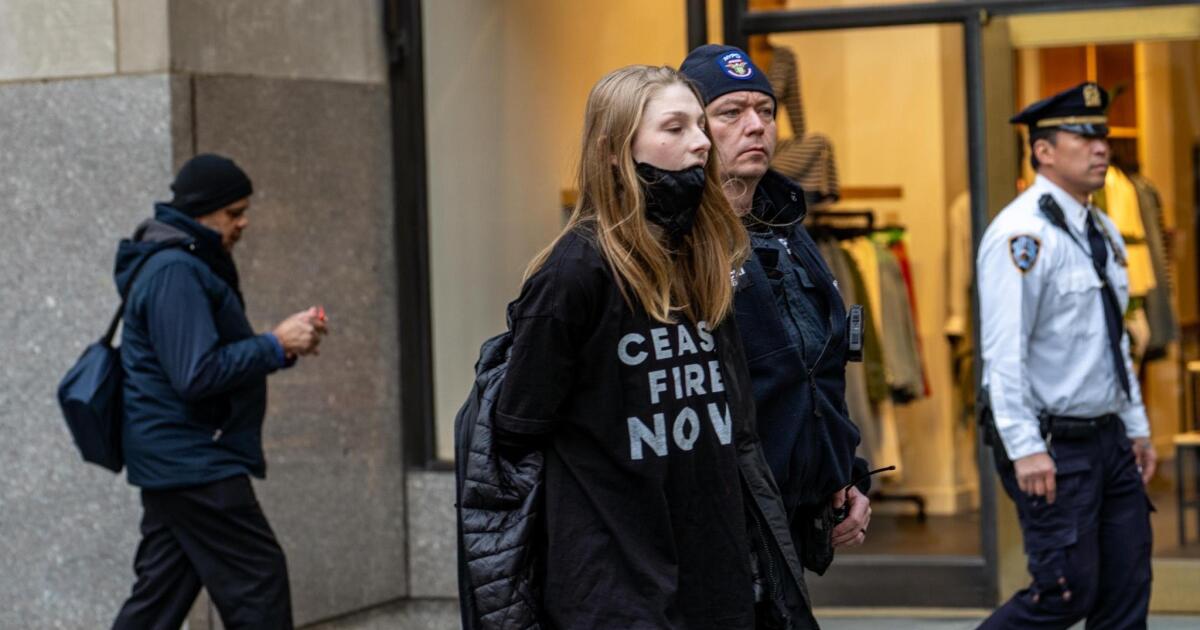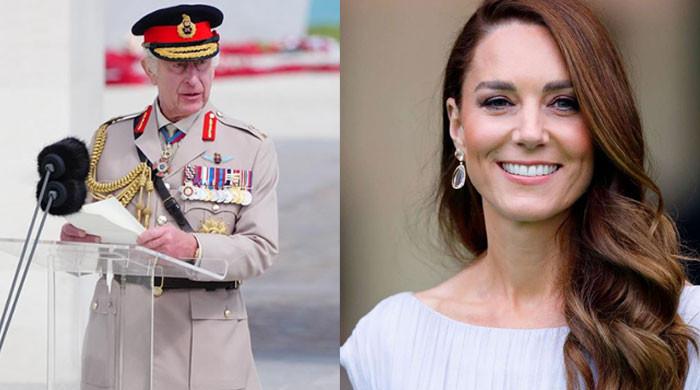Alex Hassilev, the singing, songwriting, guitar and banjo virtuoso who was the last surviving original member of the 1960s folk trio the Limeliters, died of cancer April 21 at Providence St. Joseph Medical Center in Burbank. He was 91 years old.
Hassilev was the youngest member of the Limeliters, whose other original members were bassist and comic spokesman Lou Gottlieb (1923-1996) and star tenor Glenn Yarbrough (1930-2016). The band was second only to the Kingston Trio in popularity during the peak years of the American urban folk music boom of the late 1950s and early 1960s.
After becoming a successful act at San Francisco's legendary Hungry i nightclub just two months after their formation in 1959, the Limeliters became an unavoidable presence in the media. They recorded 13 albums, appeared on television and toured up to 310 days a year. Their most enduring album, “Through Children's Eyes,” was popular with generations of children and their parents.
Hassilev's powerful skills on banjo and guitar gave the group's music much of its rhythmic drive, and his background in foreign languages, particularly French, Portuguese, and Russian, made it possible to add songs from outside American folk music. to the group's repertoire. Tall, elegant and handsome, Hassilev was also the sex symbol of the trio.
Hassilev was born in Paris on July 11, 1932, to Russian émigré parents, Leonide and Tamara Hassilev. Like his colleagues in the Limeliters, he was an only child and, between themselves, the three musicians were probably the closest thing they had ever had to brothers.
The Hassilevs were Jewish and left Paris for New York City in 1939 before the Nazi occupation of France during World War II, and in Manhattan Leonide Hassilev continued his career as a civil engineer specializing in hydroelectric projects. Hassilev had shown early brilliance as a child, learning new languages with ease and eventually speaking six fluently. When he arrived in the United States, he discovered that he was ahead of his classmates.
“I moved quickly in school, except I was terrible in the shop,” he said in one of the interviews that ultimately led to my recent biography of the band's main trio, “Makin' a Joyful Noise: The Lives and Times of the (Slightly) Fabulous limeliters.” “I was good at everything in those days because I had tremendous experience from my European days, where they taught at a higher level.”
Hassilev's musical training focused mainly on the classical field, although he knew some Russian folk songs brought to him by his parents, as well as some Brazilian and French songs. He said that he did not discover American folk music until he was 20, when he was stationed in England after being drafted into the army.
The opportunity to hear the Weavers' recording of “Kisses Sweeter Than Wine” on the radio electrified him.
“I thought, damn, that's the best thing I've ever heard in my life, and it impressed me so much that it sparked my interest in American folk music,” he said during an interview in 1989. “At the time, I didn't know any songs in English.” ”.
Hassilev attended Harvard for a year but, dissatisfied with the Ivy League environment, transferred to the University of Chicago with the idea of entering the diplomatic corps. The lure of theater eventually prevailed and he enrolled at New York's Neighborhood Playhouse, where he studied with Sanford Meisner and Martha Graham. Upon graduation, he sought work as an actor while participating in the folk music scene in Greenwich Village, where he met Yarbrough at a party.
Eventually, Yarbrough asked Hassilev to join him as co-owner and performer at an Aspen, Colorado nightclub called Limelite, forming a trio with singer and actor Marilyn Child. The two men also sang together at a small Hollywood club called Cosmo Alley, and it was there, in 1959, that Gottlieb, then trying to sell arrangements to the Kingston Trio, heard and liked his sound.
At first, Gottlieb simply wanted help making demo tapes for the Kingstons to learn songs, but Hassilev and Yarbrough responded with an offer to create their own act. Gottlieb agreed and was hungry for owner Enrico Banducci to offer the new trio of Gottlieb, Hassilev and Yarbrough a gig there, unseen and unheard.
Banducci's bet paid off. Within days of opening, the Limeliters were selling out the club and were besieged by offers from major record companies eager to cash in on the folk boom. After making a modest-selling album for Elektra, the group signed with RCA Victor. Their first RCA album, “Tonight: In Person,” recorded live at Ash Grove in Los Angeles, peaked at No. 5 on the charts. Commercials for Folger's coffee, L&M cigarettes, Ford Motor Co. and Coca-Cola followed, irritating folk purists but giving the group immense exposure.
The Limeliter Three were a collection of intelligent and volatile personalities armed with formidable debating skills, and they regularly argued over repertoire, money and even the clothes they wore on stage.
“They broke up every day of their existence,” recalled their then-manager Ken Kragen. Their touring schedule increased tensions, and a plane crash in December 1962 near Provo, Utah, which they were lucky to survive with only minor injuries, contributed to their first breakup. Yarbrough left the group in July 1963 to go solo; Hassilev and Gottlieb continued for two years as a recording group to fulfill their contract with RCA Victor, with Ernie Sheldon replacing Yarbrough.
Not knowing what to do next, Hassilev attempted a solo singing career, but gave up after two failed albums and an aborted nightclub concert. He turned to acting and landed a featured role as a Russian-speaking sailor in Norman Jewison's Cold War comedy “The Russians Are Coming” as well as a guest role on the television show “Get “Smart.” He became interested in producing records and founded a home recording studio that in its heyday operated 24 hours a day in his basement in West Hollywood, near the Sunset Strip.
His studio was one of the first to have a Moog synthesizer, long before the Beatles, the Monkees and other pop bands discovered the instrument. He and Mort Garson used the Moog to help create a moderately sized hit album, “The Zodiac: Cosmic Sounds.” As a producer, Hassilev also arranged for Gottlieb and Yarbrough to record a period-pop-flavored Limeliters reunion album, “Time to Gather Seeds,” in 1968.
Eventually, Hassilev tired of running the studio and reduced his schedule. When the opportunity came to reunite the Limeliters as a part-time touring act in 1972, Hassilev, who was now the sole owner of the rights to the group's name, jumped at the chance. The old vocal chemistry was still there; The show garnered very positive reviews and large crowds. But the folk boom had long since fizzled out and the Limeliters were never able to attract the same level of attention from record companies.
Eventually, Yarbrough grew restless, left the trio in 1977, and returned in 1980, only to leave again after a few months of touring in which the group's old tensions resurfaced. Hassilev, now fully in charge, kept the Limeliters going, replacing Yarbrough with tenors Red Grammer in the 1980s and Rick Dougherty in the 1990s, experimenting with country music before returning to their folk base.
When Gottlieb died suddenly in 1996, Hassilev replaced him with Bill Zorn. That edition of the Limeliters lasted until 2002, when Hassilev developed bladder cancer and had to leave the road. When he recovered, a legal dispute destroyed that edition of the trio, but Hassilev kept the Limeliters going, teaming with Andy Corwin and Mack Bailey.
Hassilev retired in 2006, leaving leadership of the touring Limeliters to Corwin while still owning the group's name. Under Corwin, the Limeliters, with several personnel changes, remain active to this day.
When he retired, Hassilev moved from West Hollywood to North Hollywood, where he spent hours upon hours editing and resequencing potential albums of his work alone and with the trio, in addition to pampering his five dogs. Although increasingly physically immobile in his later decade, Hassilev remained mentally alert, becoming conservative in his politics and willing to debate with his liberal friends. Even in his 90s, he could command a room with his low-baritone voice and a warmth that could soften tension.
Hassilev's survivors include his second wife, Gladys; his son from his first marriage to Ginger Stagner, David; two grandchildren; and three great-grandchildren.












